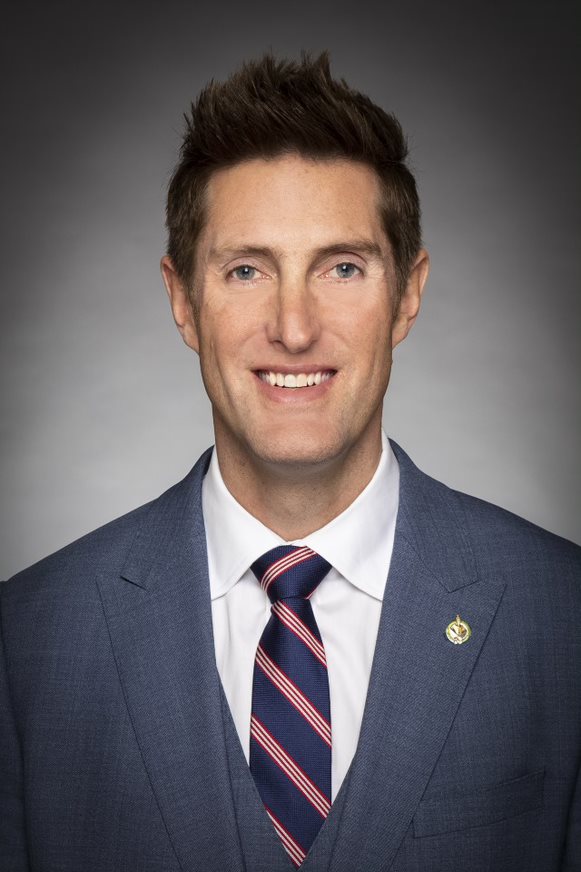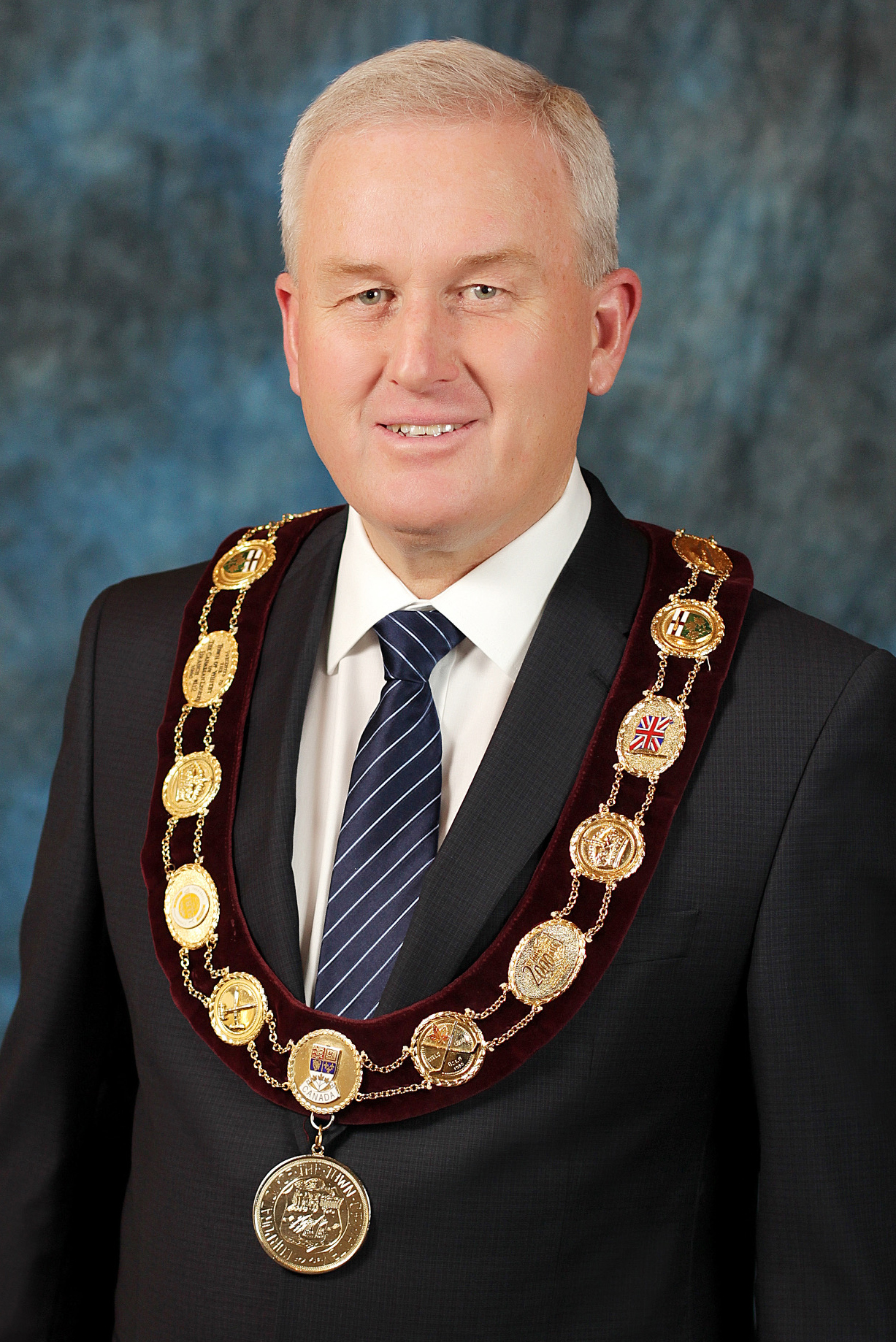Ask a Leader
Are you a member of the Whitby Chamber of Commerce (WCC)? Use this form to submit a business-related question to a specific elected representative and they’ll do their best to respond as quickly as possible. We are targeting a turn-around time of five to seven business days. The objective is to continue a dialogue, respond to specific concerns and centralize the information by publishing the questions and answers so that our business community can remain informed.
The WCC Advocacy Committee will ensure the questions are sent to the appropriate respondent(s) and may edit the questions to ensure clarity and avoid duplication. Contact information is requested to allow the committee to follow up if necessary, but will not be published.

MP Ryan Turnbull

MPP Lorne Coe

Regional Chair John Henry

Mayor Don Mitchell
Previously Asked Questions
Since day one, our government has made affordability a priority for the people of Ontario. We are constantly reviewing opportunities to lower the cost of living for hardworking families and that includes the many costly policies enacted by the Del Duca-Wynne Liberals.
Answered by MPP Lorne Coe on November 29, 2021
Please note that the Ministry of Health has been hard at work during the COVID-19 pandemic ensuring that patients have access to the care they need — when they need it. This includes eye and vision care for Ontarians.
For years, previous Governments ignored Ontario’s optometrists. Their last agreement expired in 2011. That is unacceptable, which is why our Government has made every effort possible to lay the foundation for a long-term relationship with the Ontario Association of Optometrists “OAO”. This includes engaging a third-party mediator, chosen by the OAO, to assist us in reaching an agreement and offering a one-time lump sum payment, as well as an immediate OHIP fee increase. This represents a significant and sustainable increase in today’s highly constrained fiscal environment.
That is why as part of our offer we have proposed to immediately set up a joint working group, to understand these and other issues as quickly as possible We know many Ontarians are concerned about what this means for their eye and vision care. To be clear, the Government continues to fund these optometry services through OHIP. Any decision to withdraw services is the decision of individual optometrists. Their regulatory body, the College of Optometrists of Ontario, has made it clear that if an optometrist decides to withhold care from their patient, they are expected to take steps to ensure patients can continue to receive appropriate care such as providing urgent services or providing referrals for non-urgent services.
Despite the OAO’s refusal to come back to the table, the Government has made an immediate one-time payment of $39 million to optometrists in good faith to demonstrate our commitment to reach an agreement. This payment amounts to funds they would have received since their last deal with the previous government expired in 2011, had they received similar increases to physicians over that period. In addition to this one-time funding boost, we have also offered an immediate OHIP fee increase of 8.48 per cent, retroactive to April 1, 2021, as well as a joint working group to collaborate on investigating the cost of overhead, which we know is important to optometrists.
As the Ministry of Health has said repeatedly, we are ready and waiting to continue meaningful and productive discussions. We urge the OAO to come back to the table and work with us to ensure Ontarians continue to access the care they need and deserve.
Answered by MPP Lorne Coe on November 5, 2021
September 30th, a national day for Truth and Reconciliation, is a statutory holiday for federally regulated employees across Canada to honour Survivors, their families, and communities and ensure that public commemoration of the history and legacy of residential schools remains a vital component of the reconciliation process. This holiday was in response to one of the 94 Calls to Action of the Truth and Reconciliation Commission. It takes effect this September 2021. Federal offices and banks will be closed.
The holiday does not apply to the provinces, as they have to make their own amendments to provincial employment legislation.
Answered by MP Ryan Turnbull on August 30, 2021
Thank you for your email about the re-opening details for sport and recreation activities.
As you have noted, last summer the reopening regulations were different than what is currently in place. The measures in place now are essential to bringing us closer to the day when the pandemic can be contained, and more regular activities can resume. We will continue to work with sport stakeholders on reopening plans as we progress through the Steps of the Roadmap, including guidance and measures for a safe reopening.
Answered by MPP Lorne Coe on June 6, 2021
This question is specific to signage for a new dental business in Brooklin. Whitby has strong signage policies that are designed to maintain high standards and avoid unsightly sign clutter. There are time limits for the oversized temporary signage which is often used when a business opens.
In this particular situation, staff have been working with the business owner to get appropriate permanent signage in place and to have the temporary signage - which has exceeded its maximum permitted time limit - removed. Staff recognize these are challenging times and understand the importance of signage for a new business and will expedite all steps within their control to get the proper permanent signage in place.
Answered by Mayor Don Mitchell on May 27, 2021
The Ontario Government has intensified its focus on workplace testing to help stem the tide of the third wave and prevent additional workplace outbreaks. Workers who test positive for COVID-19 are sent home to safely quarantine, and when it is determined that the test is a false positive, they are permitted to return to their job.
The Chief Medical Officer of Health for Durham Region, Dr. Robert Kyle issued an Order under the Health Protection and Promotion Act to all owners and operators of workplaces. The Order instructs all owners and occupiers of workplace premises in Durham Region to ensure public health measures are followed. This includes creating and implementing safety plans, ensuring active screening of all employees and visitors, proper cleaning and disinfecting, appropriate use of PPE, physical distancing, and adhering to outbreak protocols if cases of COVID-19 are identified.
Durham public health inspectors along with Provincial enforcement agencies work with owners and operators of workplaces to ensure they are aware of the required public health measures and are taking the necessary precautions to prevent the spread of COVID-19.. Dr. Kyle’s staff follows up with workplaces when cases of COVID-19 are identified to ensure outbreak management.
Additionally, the provincial Government has administered over 7 million COVID-19 vaccines in Ontario, as well as expanded eligibility to anyone over 18 years of age. This effort coupled with the increased focus on workplace testing will curb the spread of the third wave and allow the Province to safely re-open more quickly. Please see the attached Reopening Plan.
Answered by MPP Lorne Coe on May 21, 2021
Thank you for your message. The Provincial Government is filling the gap in the Federal Government’s Canada Recovery Sickness Benefit (CRSB) to ensure workers have access to the most generous pandemic paid leave in the country. In short, there are 3 total paid sick days (up to $200/day) being paid for by the Province. Once those are used, we encourage you to apply for the Federal benefits, which brings the total to 23 available days.
We have also provided funding to the Federal Government to double payments to Ontario residents, adding an additional $500 per week to eligible individuals for a total of $1, 000 per week. This is retroactive to April 19, 2021, and effective until September 25, 2021, the date the CRSB will expire. By providing time-limited paid leave, we are ensuring workers can stay home if they’re feeling symptoms of COVID-19. These latest measures build on other existing provincial supports like job-protected leave, and if required access to isolation facilities.
Please also refer to this link for stay-at-home order extension information.
Answered by MPP Lorne Coe on May 14, 2021
Budget 2021 has brought forth an additional initiative to combat the economic burden brought on by the COVID-19 pandemic. The new Canada Recovery Hiring Program is a proposed subsidy that would allow Eligible employers that have continued to experience qualifying declines in revenues relative to before the pandemic to offset a portion of the extra costs employers take on as they reopen, either by increasing wages or hours worked or hiring more staff. This support would only be available for active employees and will be available from June 6 to November 20, 2021.
Additionally, employers would claim the higher of the Canada Emergency Wage Subsidy or the new proposed subsidy. The aim is to make it as easy as possible for businesses to hire new workers as the economy reopens. As the rates for both the wage subsidy and the hiring program will slowly ramp down over time, employers will have a strong incentive to begin hiring as soon as possible and maximize their benefit.
While the details of the program will further develop leading up to the launch of the support, our office will ensure to keep the Chamber and its members updated throughout. We are incredibly excited about this supplementary initiative, as it will further ensure the business community of Whitby can build back better.
Answered on May 12, 2021, by MP Ryan Turnbull
Vaccines are an important tool to stopping the spread of COVID - which is why we’ve procured enough for every Canadian and we are aware that some provinces and territories are exploring options for certification after vaccination. Science is clear that vaccines approved for use in Canada are safe and effective. As scientists around the world work to understand COVID-19 immunity, we must keep practicing public health measures to keep each other safe. Countries around the world are working together to stop the spread of COVID-19 at home and abroad. We have been in contact with international partners to address future challenges of travel and immunity. Any changes to public health measures will be based on science and evidence. In the meantime, our travel advisory remains in place – Canadians should not be travelling right now.
Answered on April 8, 2021, by MP Ryan Turnbull
In February 2021, our Government announced an agreement in principle with CP on the use of their train tracks that cross Highway 401. Discussions are underway with CP to finalize a commercial agreement. Minister Mulroney will have more exciting news to share once those discussions conclude.
Answered April 6, 2021, by MPP Lorne Coe
Making life affordable in Ontario has been a priority for the Government since day one.
We understand the economic difficulties that Ontarians are facing right now, and our responsibility is to support Ontario families and workers through these challenges. In response to the COVID-19 pandemic, the Minister of Transportation took swift action to:
- Suspend the collection of interest on unpaid toll fees from Highways 407 East, 412 and 418;
- Froze the scheduled increases to driver and carrier products, like driver’s licenses and validation tags;
- Extended the validity of government driver, vehicle and carrier fees and;
- Froze the scheduled CPI increase to toll rates on Highways 407 East, 412 and 418 that were scheduled to come into effect on June 1, 2020.
Our Government supports Bill 43 in principle and believes it would benefit from further study. The Ministry of Transportation (MTO) has undertaken a study to assess the economic impacts of tolls in the Durham Region, and we hope to be in a position to share this report with the public very soon.
Answered April 4, 2021, by MPP Lorne Coe
Employees are required to wear non-medical face masks/face coverings in the following areas:
- When in an area that is accessible to the public
- When in an area where they can interact with the public or other staff members
If an employee refuses to wear a mask, they can work in other areas that are inaccessible to the public and in areas where physical distancing (2 meters) from other employees can be maintained at all times.
Answered July 17, 2020
Businesses are not required to provide non-medical face masks or face coverings to the public. It is not necessary to purchase a non-medical face mask, the instructions indicate that a face covering such as a bandana, a scarf or cloth (including hijab and niqab) that covers the mouth, and nose are acceptable options.
Answered July 17, 2020
The instructions are directed to commercial establishments that meet the definition regardless of the size of the indoor space. At this time, schools are excluded from the instructions and should have their own policies in place to ensure the safety of students, staff and faculty.
Answered July 17, 2020
Our government has ensured that our trade responses are effective and proportionate. The Government of Canada has issued a Notice of Intent which outlines our countermeasures in trade. Canada intends to impose surtaxes against imports of aluminum and aluminum-containing products from the U.S., representing a proportionate amount of Canadian aluminum products affected by the U.S. tariffs.
Our government has supported Canadians directly during this pandemic with measures like the Canada Emergency Response Benefit and the Canada Emergency Wage Subsidy. We will continue to support Canadians during this uncertain and challenging time.
Answered September 14, 2020 by MP Ryan Turnbull
I have advocated for the extension of the Canada Emergency Commercial Rent Assistance program and I am pleased to report that this vital program will be extended for one month. Following that, the program will be reexamined to best meet the needs of Canadian businesses during this challenging time. I have heard from small businesses in Whitby about how important this support has been and I will continue to be their champion.
Answered September 14, 2020 by MP Ryan Turnbull
Thank you for your question, please note that concern about plastic pollution in the environment, including harm to fish and wildlife, has resulted in a number of local, national and international actions to study, reduce, and clean up plastic pollution. Plastic litter and microplastics can negatively impact freshwater systems, with high levels being seen in the Great Lakes and some inland waters. The pollution and waste caused by the improper management of plastics is an important environmental issue. Ontario feels strongly that great economic, environmental and social benefits can be achieved for all of Canada by focusing on increasing the recovery and recycling of plastics.
Currently approximately 30% of residential plastic packaging is recovered through the Blue Box program and sent to market. This includes higher recovery rates for PET and HDPE bottles (55% and 54% respectively), with much lower recovery rates for film (10%), plastic laminates and polystyrene (<5% each). These figures are based on Stewardship Ontario, the Industry Funding Organization that operates the Blue Box Program. As part of our Made-in-Ontario Environment Plan, the goal is to recycle and return materials back into economy and reduce the amount of materials going to landfill or final disposal. Thermal treatment of materials (including energy-from-waste facilities) does have its place within the waste hierarchy and is an important component of the overall waste strategy to manage materials that cannot be recycled. In addition, facilities that use thermal treatment to generate electricity require a consistent composition and volume for the waste being generated. Large amounts of plastics can result in the system operating at higher than desired temperatures, leading to a reduction in the amount of waste processed per day, and can damage the equipment. As a result, facility operators manage the amount of plastics that are thermally treated in their systems to ensure peak operations. To improve these recycling numbers, Ontario is taking action to improve recycling across the province and address the serious problem of plastic pollution and litter, as committed to in our Made-in-Ontario Environment Plan.In August 2019, Ontario announced the next steps for improving the Blue Box Program and transitioning the costs away from municipal taxpayers to make the producers of products and packaging responsible starting in 2023. By December 31, 2025, producers will be fully responsible for providing Blue Box services provincewide. Over the next few months, we will develop and consult on regulations to support the new producer responsibility model for the Blue Box Program. With these changes, the Blue Box Program will continue to be convenient and accessible for the people of Ontario. Residents who currently receive municipal Blue Box services will continue to receive the same services throughout the transition period. Once producers are fully responsible for the program, Ontarians will experience the same or improved access to Blue Box services across Ontario. Making producers responsible for the delivery of Ontario's Blue Box Program will ensure that the Blue Box remains viable over the long term while giving producers tools to find efficiencies and lower costs. Our three main objectives include: achieving a circular economy, minimizing material that goes to landfill, and ensuring consistently reliable service for the people of Ontario. We are also looking at how plastic, paper and packaging materials are collected from schools, apartment buildings, retirement homes and other institutional sources as well as commercial and industrial sources. The Ministry encourages actions that everyone can take to reduce the amount of plastic. For the most recent information on the actions of the Ministry of the Environment, Conservation and Parks, please see our Facebook page or twitter feed.
Answered October 5, 2020 by MPP Lorne Coe
All of the material collected in residential blue boxes is delivered to the Region’s Material Recovery Facility (MRF) for sorting, baling and sale. The 2019 residue rate from the MRF was seven per cent. That means 93 per cent of the material collected in the blue box was recycled.
NOTE: Once blue box materials are sold to the market, further sorting may be undertaken by recyclers that could decrease the quantity of materials actually recycled.
The Region collects plastics that fall into four categories: polyethylene terephthalate (PETE), high density polyethylene (HDPE), Rigid mixed plastics and tetra paks/gable tops. All four of these categories are sold by the Region to recyclers. Pricing varies from month to month and for different materials. In 2019, the average price per tonne for the various plastics collected in the blue box ranged from $20/tonne to $450/tonne.
The Region has a policy to not collect material in the blue box unless there is a stable recycling market available for the material. This is one reason film plastic like grocery bags or milk bags is not collected for recycling.
Answered October 5, 2020 by Regional Chair John Henry
With respect to implementing safe practices, please see “Resources to Prevent COVID-19 on the Workplace” found here: https://www.ontario.ca/page/resources-prevent-covid-19-workplace.
The website provides guidelines on how to create a safety-plan to lower the risk of COVID-19 spread. There is also information regarding acquiring necessary Personal Protective Equipment (PPE).
Last month, Associate Minister for Small Business and Red Tape Reduction, Prabmeet Sarkaria, announced a $60 million investment to assist small businesses in PPE costs. This plan includes a one-time grant of up to $1,000 for eligible main street small businesses — in retail, food and accommodations, and other service sectors — with two to nine employees to help offset the unexpected costs of personal protective equipment. Included in this announcement is Ontario's Small Business COVID-19 Recovery Network, which links 47 Small Business Enterprise Centres across the province as places where small businesses can access tailored advice and information on local, provincial and federal programs. A detailed list of eligible businesses can be found at Ontario.ca/covidsupport. Moreover, the Business Advisory Centre Durham (BACD) is an available resource for new small business owners, and can assist entrepreneurs with skills, knowledge, tools and connections to launch and grow successful businesses within the Region of Durham.
On November 20th, the Government announced a doubling of funding available to support employers affected by the necessary public health measures we are taking to protect people during the second wave. The $600 million we are providing will help businesses cover fixed costs associated with energy and property tax bills.
It is important to note that eligible businesses can now apply for temporary property tax and energy cost rebates directly to the province through a single, online application portal found here: https://www.ontario.ca/page/businesses-get-help-covid-19-costs.
Answered October 30, 2020 by MPP Lorne Coe
Business owners are encouraged to visit the health department website at https://www.durham.ca/en/health-and-wellness/community-reopening-toolkit.aspx. There are many resources including posters, how to create a safety plan and sector specific guidelines. If there are still questions following the review of our resources, they may call the Durham Health Connection Line at 905-668-2020 (or toll-free 1-800-841-2729) to speak with a public health inspector to assist them.
Answered October 30, 2020 by Regional Chair John Henry
All COVID-19 updates from the WCC can be found at www.whitbychamber.org/covid-19. Information from the Region of Durham can be found at www.investdurham.ca/covidresponse.


